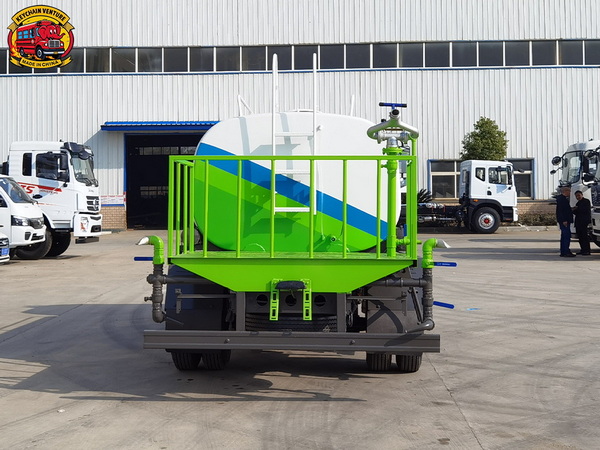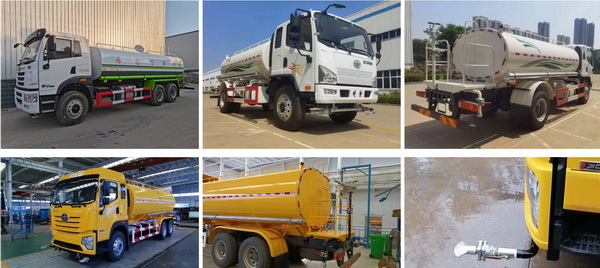Views: 222 Author: Amanda Publish Time: 2025-08-24 Origin: Site








Content Menu
● Introduction to Water Trucks
● Factors That Affect Water Truck Capacity
● Common Water Truck Capacities
>> Small Capacity Water Trucks (1,000 - 2,500 gallons)
>> Medium Capacity Water Trucks (2,500 - 4,000 gallons)
>> Large Capacity Water Trucks (4,000 - 5,500+ gallons)
● How Is Water Truck Capacity Measured?
● Examples of Water Truck Capacities by Industry Applications
● Water Truck Tank Materials and Design
● Operational Considerations for Water Truck Capacity
● Innovations and Future Trends in Water Truck Technology
● Summary
● Frequently Asked Questions (FAQ)
>> 1. What is the typical capacity range of a water truck?
>> 2. How does the water truck size affect its operation?
>> 3. What materials are commonly used for water truck tanks?
>> 4. Can water trucks be used for firefighting?
>> 5. How do legal weight limits impact water truck capacity?
As a leading supplier in the commercial vehicle sector, KeyChain Venture Co., Ltd. specializes in providing high-performance solutions for buses and heavy trucks, including specialized water trucks. Understanding the capacity and capabilities of a water truck is essential for industries that rely on efficient water transportation and delivery for multiple applications such as construction, mining, agriculture, firefighting, and road maintenance.

A water truck is a specialized commercial vehicle designed to transport and spray large volumes of water. Unlike regular trucks, water trucks are equipped with large tanks and spraying apparatus for distributing water on demand. These trucks are popular in various industries due to their ability to address dust control, irrigation, compaction, and even emergency firefighting needs.
Water trucks are often considered indispensable on construction sites to manage dust and maintain soil compaction. They are also widely used in mining operations to suppress dust and cool equipment. In agriculture, water trucks help with irrigation where fixed irrigation systems are unavailable or impractical. Additionally, municipal authorities deploy water trucks to clean streets and parks or deliver emergency water supplies.
The water carrying capacity of a water truck depends on many factors, including the truck's size, tank design, chassis strength, and the laws governing vehicle weight on roads. The intended purpose of the water truck also influences tank capacity — for example, a truck used primarily for dust suppression may have a different capacity than one equipped for firefighting.
- Tank Size: This is the central determinant of how much water a truck can hold. Tanks come in various volumes, and their shape and material can affect overall capacity.
- Chassis Strength: Heavy-duty chassis are required to support larger tanks which allow for increased volume.
- Weight Restrictions: Legal limits on vehicle weight, especially for highway travel, impose maximum water volumes that trucks can legally carry without special permits.
- Water Density: It's important to note water weighs approximately 8.34 pounds per gallon (1 kg per liter), so even a relatively modest increase in volume can significantly increase total payload weight.
Water trucks come in various sizes, typically measured in gallons or liters. The most common water truck capacities range from about 1,000 gallons (around 3,785 liters) to over 5,500 gallons (approximately 20,832 liters).
These smaller water trucks are often used for landscaping projects, small construction sites, and agricultural irrigation. Their relatively compact size allows for greater maneuverability in confined spaces such as urban job sites or farm fields.
They typically feature tanks constructed from polyethylene or aluminum to minimize the truck's overall weight, making them easier to transport and operate in tighter environments.
Medium-sized water trucks are versatile and commonly used in road construction, mining operations, and municipal services. Their balanced capacity and mobility make them a popular choice for many companies. They can supply enough water to control dust over a broad area while still being agile enough for moderately tight spaces.
The tanks on these medium trucks tend to be made of steel or aluminum with reinforced chassis for added durability. Their spraying systems often feature adjustable nozzles and hose reels for precision application.
For larger industrial applications, especially in mining and large-scale construction, water trucks with tanks exceeding 5,000 gallons are deployed. These trucks require stronger chassis and more powerful engines to handle the increased load.
Large capacity water trucks are typically engineered with steel tanks affixed to heavy-duty commercial truck frames. Their water delivery systems are designed to spray large volumes quickly, often including high-capacity pumps and multiple spraying zones for maximum flexibility.

Water truck capacity is measured primarily by volume — in gallons or liters. This is the total amount of water the tank can hold when completely filled. It's important to distinguish between gross volume and usable volume: usable volume is often slightly less because of tank design elements like baffles, fittings, or tank overflows that reduce the effective water-carrying space.
Manufacturers usually specify tank capacity in their technical documents. For example, when a water truck is labeled as having “3500-gallon capacity,” this indicates the tank can hold roughly 3,500 gallons of water at full volume. The common conversion is 1 gallon = 3.785 liters, important to keep in mind for international applications.
Different industries have varying water volume requirements, affecting the choice of water truck capacity:
- Construction: Dust suppression and soil compaction require dependable water coverage, usually demanding trucks with 2,000 to 4,000 gallons capacity.
- Mining: Due to large site sizes and dust potential, mining operations often use trucks with 4,000 gallons or more.
- Agriculture: Irrigation water trucks typically carry 1,000 to 3,000 gallons — enough to support targeted irrigation on fields that lack fixed sprinklers.
- Firefighting: Water trucks used for firefighting have specialized tanks and pumps and typically carry 3,000 gallons or more to meet emergency needs quickly.
The choice of material for the water truck tank impacts both durability and total vehicle weight:
- Steel Tanks: Very durable and easy to repair, but heavier. They impart extra weight on the truck even when empty.
- Aluminum Tanks: Lightweight and corrosion-resistant, aluminum helps increase payload capacity and improve fuel efficiency.
- Polyethylene Tanks: Lighter and resistant to rust and corrosion but may be less reliable in extreme conditions or impacts.
Tank design also matters. Horizontal tanks are common; however, elliptical or cylindrical cross-section tanks can optimize space utilization and improve vehicle stability by lowering the center of gravity.
Inside, tanks may have baffles (partitions) to reduce water sloshing during transit, which can otherwise affect vehicle handling and safety.
Several operational factors impact the real-world utility of a water truck:
- Road Weight Limits: Even if a water truck's tank can hold a large volume of water, road weight regulations may limit the maximum amount allowable during transport.
- Filling and Emptying Time: Larger tanks take longer to fill and empty, so operational schedules must accommodate these durations to maintain efficiency.
- Spraying Efficiency: Quality spraying systems allow better water distribution, reducing waste and ensuring the water truck performs its intended function effectively.
- Vehicle Stability: Full water trucks have different driving dynamics. Operators need training to handle the increased inertia and altered center of gravity to ensure safe maneuvering.
- Maintenance: Routine tank cleaning prevents bacterial growth and sediment buildup that could damage the tank or contaminate water.
Water trucks are evolving with technology to become smarter, cleaner, and more efficient:
- Smart Spraying Systems: Integration of GPS and IoT-enabled controls allows operators to precisely target water applications, conserve water, and track usage data.
- Alternative Fuels and Electrification: Emerging hybrid and fully electric water trucks aim to reduce carbon emissions and fuel costs while maintaining performance.
- Lightweight Materials: The use of composites and advanced alloys reduces tank weight, enabling higher payloads and better fuel efficiency.
- Automation: Semi-autonomous operation is beginning to emerge, assisting in precise driving and water application especially in large or hazardous environments.
- Environmental Compliance: New designs focus on reducing water waste and runoff, a critical factor in environmentally sensitive project sites.
The capacity of a water truck varies widely depending on vehicle size, tank design, and application requirements. Typically, water trucks hold between 1,000 and 5,500 gallons of water. Selecting the right capacity water truck involves balancing operational needs with legal weight restrictions and site conditions.
Water trucks remain crucial for industries such as construction, mining, agriculture, firefighting, and municipal services. By partnering with experienced manufacturers like KeyChain Venture Co., Ltd., businesses can access reliable, high-performance water truck solutions tailored to their unique project requirements.
As technology continues to advance, water trucks are becoming smarter, more efficient, and more environmentally friendly — ensuring they will remain an essential tool for many industries worldwide.

The typical water truck capacity ranges from 1,000 gallons (about 3,785 liters) for small trucks up to over 5,000 gallons (more than 18,900 liters) for the largest models used in heavy industries and large-scale operations.
Larger water trucks carry more water but may face restrictions on road weight limits, require stronger chassis, and may be less maneuverable. Smaller trucks offer greater flexibility but have lower carrying capacity.
Water truck tanks are usually made of steel, aluminum, or polyethylene. Steel is durable and heavier, aluminum is lightweight and corrosion-resistant, and polyethylene offers good resistance to rust but is less rigid.
Yes, specialized water trucks equipped with larger tanks and high-pressure pumps are widely used for wildfire and structural firefighting, usually with capacities of 3,000 gallons or more.
Legal weight limits restrict how much water a truck can carry safely and legally because water is heavy. Operators must balance tank volume with permissible weight limits to comply with regulations and ensure safe operations.
Field Visit To DR Congo – Products in Action, Friendships in Progress
A New Chapter of Collaboration: Katie’s Productive Visit to Jiangxi Kama Business Bus Co., Ltd
Embracing Innovation And Collaboration: Our Experience at The 7th CWCIFIT
Celebrating Another Milestone: Successful Delivery of Buses to Our African Partners!